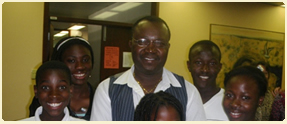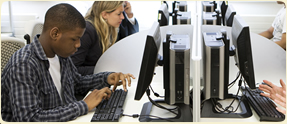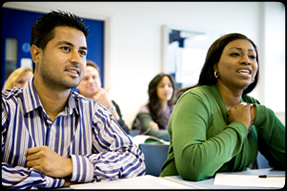voices



listen to the experiences of refugee students
REFUGEE STUDENT PERSPECTIVES
Below are quotes and videos of students from refugee backgrounds talking about their experiences and challenges while studying in Australia.
DOUBLE CLICK ON THE VIDEOS TO WATCH
The videos may take a while to load. We appreciate your patience.
Hurdles & motivation
“…To me the difficult part of getting to uni is the process of getting admitted…almost all of the things, to me the difficult part of getting to uni is the process of getting admitted and battling out your preference and stuff because like…I almost gave up studying. Then I apply for the first time, I didn’t get through .”
- Sudanese male student studying Environmental Health
Difference between African & Australian educational systems
“[In Africa] there’s a pressure from everyone else, there’s always constant reminders, but here, you’re on your own, you’ve got not one around that cares, it’s up to you whether you succeed or not… you can’t rely on teachers to tell you anything so, basically you have to … independent and responsible, so far that’s what I know, but so far I haven’t really learnt it.”
- Somali male studying Commerce
Difference from Australian students
“What happens is, we have to learn two or three things at the same time…Most people who are here and go to uni they know they are going there to learn, but sometimes we go there to learn something from the class and also something of the lifestyle at the same time.”
- Female Nursing student from Sierra Leone
Previous education
“You might be studying but because of the war you have to move to a different location…or you are studying in the refugee camp, and then they move you to another camp that has no teachers, so you can’t go to school anymore.”
- Female student from Sierra Leone
English skills
“Even if I know the topic very well… you find they start talking fast and sometimes it takes me a while to understand the topic.”
- Somali female student
Gender issues
“That’s what happens, with almost all of our women…in our family setting, the mother or our sisters take care of the family, whether it’s cooking or washing dishes. So if I’m home, and if I start cooking, my sister feels bad… naturally that’s what they do, and even if she has her assignment to finish, if she knows the family has to eat, she has definitely to cook. So that definitely can affect their performance at the end”
- Sudanese male student
External pressures & commitments
'“Financial struggle is the most thing affecting our studies… almost everyday, you’re thinking about how you’re going to pay the next bills… my mind is always divided here in school but thinking about family.”
- Sudanese male student studying Environmental Health Science
Use of services & technology
“I don’t know about computers, so my first year was really so hard…locating resources on the internet, it’s a major challenge for most of us who come from the developing countries… we have not been exposed to this technology, and it takes some person time to get used to it and to type faster and to access information on the internet; while for other students its just a matter of seconds, it might take me ten minutes”
- Somali female student studying Nutrition
Participation in university
“Sometimes you feel isolated. That’s why sometimes I feel group work is not, its a waste of a time, because some people in my group may not want me to contribute”
- Sudanese male student studying Health Promotion
Future goals
“Personally, I want to work in a hospital, not like factory work, I want to have a career, I want to be a professional worker.
"[I tell my younger siblings] you’ll have to work in a factory as a labourer, and they say 'No I can’t go work in a factory like that' then I tell them if you want to work in the office you definitely have to study!"
- Female Student studying Nursing



